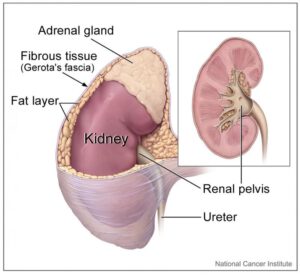What is aldosterone?
Aldosterone is a hormone made by the adrenal glands. The adrenal glands are found on top of the kidneys and are responsible for producing several important hormones. Aldosterone is essential for sodium conservation in the kidney. It plays a vital role in the homeostatic regulation of blood pressure, plasma sodium (Na+), and potassium (K+) levels. Sodium and potassium are electrolytes. They are key elements to balance the level of fluids in the human body and keep nerves and muscles working properly. An increase or Decline in ALD level can cause serious health problems.
What is the purpose of the Aldosterone Test?
The health care specialist can request an ADL test to
- Diagnose Conn’s syndrome, a disorder that causes the adrenal glands to make too much ALD.
- Check for a tumor in the adrenal glands.
- Check for enlargement of both adrenals.
- Find the reason for high blood pressure.
- Find the cause of low potassium.
- Help detects adrenal insufficiency, a disorder that causes the adrenal glands not to make enough ALD.
- Check for Secondary hyperaldosteronism.
- Preeclampsia, a type of high blood pressure that affects pregnant women

When to get tested for ALD Level?
You should consider for the ADL test when you develop the following symptoms or signs
- Weakness or Fatigue
- Tingling
- Increased thirst
- Frequent urination
- Temporary paralysis
- Muscle cramps or spasms
- Weight loss
- Stomach pain
- Dark spots of skin
- Disturbed blood pressure
- Nausea and vomiting
- Diarrhea
- Decreased body hair
What happens during Sample Collection?
The health care professional will take blood from a vein in the arm, using a small needle. After the needle is inserted, a small amount of blood will be collected in a test tube. This usually takes less than five minutes. The amount of ALD in your blood can change depending on whether you are standing up or lying down so you may get tested while you are in each of these positions.
How to prepare for Aldosterone Test?
The health professional may ask to stop taking certain medicines for 14 days before the test. These may include
- High blood pressure medicines
- Heart medicines
- Hormones, such as estrogen or progesterone
- Diuretics (water pills)
- Antacid and Ulcer medicines
- Nonsteroidal anti-inflammatory drugs
The health professional may ask you to lower your intake of certain foods before the test.
Understanding Aldosterone Test Report
The report will measure the amount of ALD in the blood. The normal range of ADL count may vary with age and testing Position. We recommend consulting your report result with your health specialist to evaluate the report as per your medical history and other factors.
| Children | Teenagers | Adults | |
|---|---|---|---|
| Standing or sitting down | 5–80 (ng/dL) or 0.14–2.22 nmol/L |
4–48 ng/dL Or 0.11–1.33 nmol/L |
7–30 ng/dL or 0.19–0.83 nmol/L |
| Lying down | 3–35 ng/dL Or 0.08–0.97 nmol/L |
2–22 ng/dL Or 0.06–0.61 nmol/L |
3–16 ng/dL Or 0.08–0.44 nmol/L |
Aldosterone Test at Awami Lab Gujrat
Awami Lab offers you the best and highly specialized and well-organized services in Gujrat for your Aldosterone Test. We entertain our patients with utmost care and a relaxing environment. Awami lab Gujrat is equipped with state-of-the-art machines and skilled professionals who assist you through your lab procedures. We make sure that the reports are handed over to the patient as soon as possible so that the further procedures of a patient’s treatment could not be delayed.




